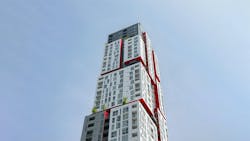Self-storage development booms in high multifamily construction areas
It seems that multifamily housing and self-storage construction go hand in hand. In over 100 metro areas across the country, self-storage units swelled in conjunction with the area’s growth in apartment complexes.
Of those metros, the five most active for self-storage development are Dallas, New York, Houston, Chicago, and Phoenix, according to a RentCafe analysis of Yardi Matrix data. These areas are the only ones in the nation that built over 10 million sf of storage space over the last decade.
However, the RentCafe analysis finds that nearly 60% of the country’s top 100 metros are also building storage units at a higher rate than the national average.
Multifamily development in the top metro areas
Dallas, New York, and Houston are among the leading metros in multifamily development, erecting 199,000, 162,000, and 142,000 apartments in the last 10 years, respectively. Each of the metros built over 15 million sf of storage space as well, with Dallas leading the way at 20 million square feet.
Since 2012, construction of multifamily complexes have increased significantly in the south and southwest regions of the country. Why? As those areas have continued to attract more people—either from the reasonable costs of living or a friendly taxation climate—new housing developments follow suit.
The Phoenix metro, for example, has had a population growth of 14% from 2012 to 2021. In addition to the 62,000 new apartments built within that time frame, 10 million sf of self-storage space was delivered.
Fastest metro areas growing self-storage inventories
Over the last decade, the national inventory of self-storage units grew by 22%. Though 58 of the 100 largest metros exceeded the national average, what were some of the fastest-growing areas for self-storage?
According to RentCafe, the Milwaukee, Wis., metro grew its inventory of storage space by 40% in the past ten years—18 points higher than the national average. Madison, Wis., and Durham-Chapel Hill, N.C., built 37% of its self-storage inventory between 2012 and 2021.
Des Moines, Iowa, increased its storage inventory by 37% as well, and even ranks second in storage affordability ($87) among the top 100 metro areas. Greenville-Anderson, S.C., has the lowest self-storage street rate at $81, while New York ranks last with the most expensive rate ($202) of all 100 metros.
What is the correlation between storage and multifamily development?
RentCafe finds that the metros that grew self-storage inventory the fastest from 2012 to 2022 tend to be on the smaller size, population-wise. This could be indicative of the growing trend of people moving to the suburbs or less crowded areas.
Why is there a correlation of increased storage unit development with multifamily housing, then? Because these packed, popular metros have renters living with multiple people in smaller spaces, additional storage could be considered a necessity. Metropolitan renters may also be relocating more frequently within the city; in that instance, the stability of self-storage is generally appealing.
As urban apartment living often comes at a premium, storage units offer tenants the additional space they need without the added expense of a higher square-foot apartment.
